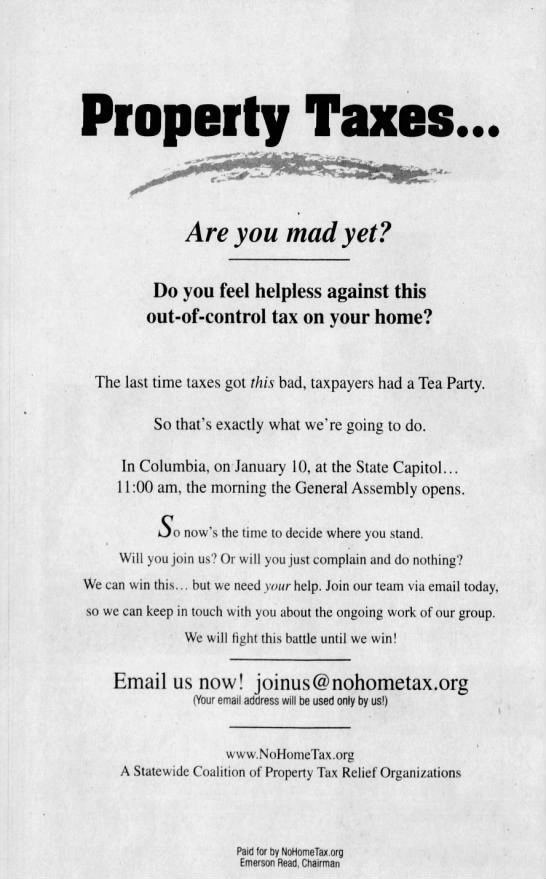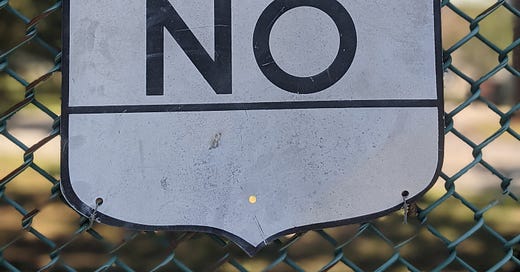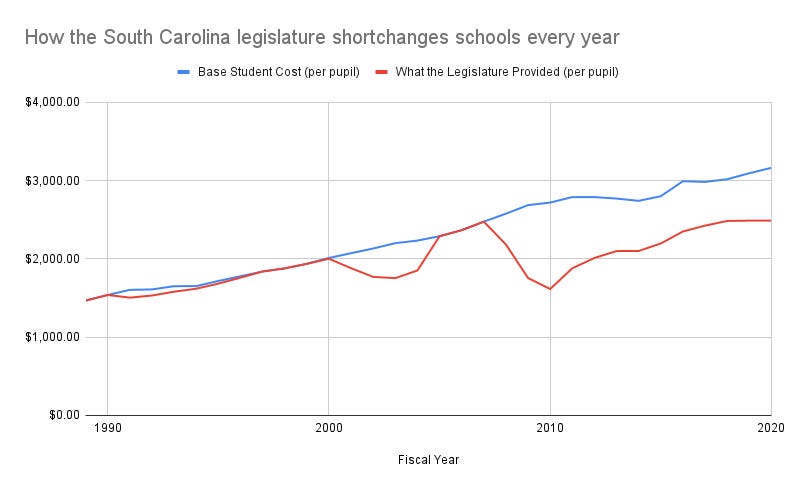If I wanted to destroy public schools, I'm not sure what I'd do differently
Beneath the culture wars, South Carolina Republicans are steadily dismantling our education system
One difference between conservatives and progressives in this country is that when conservatives want to defund a public institution, they don’t chant about it in the streets — they get to work gutting it with a knife.
I live in South Carolina, where politicians have been steadily defunding roads, bridges, water systems, K-12 schools, and colleges since I was a child.
I’m a parent of public-school kids and a graduate of a public high school and university in this state, so I think a lot about the willful destruction of our schools. I don’t know whether to expect a coup de grace of privatization or more of the same slow entropy.
Rural schools are literally crumbling. Caps on classroom size and teacher workload have been functionally eliminated. Teachers are quitting in droves, faster than we can replace them. Just yesterday, a state-commissioned report showed schools had 1,060 teaching vacancies, the largest shortfall on record since we started tracking the numbers in 2001.
If I were deliberately trying to sabotage a public school system, I can’t think of anything I’d do differently than what our legislature has done.
Culture-war chicanery at the Statehouse grabs the headlines, and often rightly so — we should put up a concerted fight against efforts to ban books or terrorize LGBT kids. But the thing we don’t highlight nearly enough is the quiet, constant erosion of public support for public schools.
Pardon me for getting technical here, but I think it’s worth highlighting exactly how they do it. At the K-12 level, the state of South Carolina promises a set amount of money per pupil to school districts each year according to an inflation-adjusted formula called the Base Student Cost. This formula is a key component of our broken school funding system that infamously failed to provide a “minimally adequate” education to all students, according to a 2014 state Supreme Court decision. It’s not great, but it’s all we’re promised.
Under the careful watch of Columbia power broker Sen. Hugh Leatherman, the state legislature has failed to fully fund the Base Student Cost every year since 2008. Leatherman died last month with legislation still on his desk, his race won, his state in shambles.
The state is currently shorting school districts by more than half a billion dollars in this budget year alone, according to figures from the state Revenue and Fiscal Affairs Office compiled by Steve Nuzum of SC for Ed.
Making matters worse, the legislature cut off schools’ access to one of the steadiest sources of revenue — homeowner property tax — with a 2006 law known as Act 388. Then-Gov. Mark Sanford gave the Order of the Palmetto, the state’s highest civilian honor, to the Charleston realtor who pushed for the policy.
Shortly after the law passed, the legislature started slashing school funding amid the Great Recession. The new tax law blew a hole in the state budget year after year.
The effects trickle down: More than a decade later, our schools are plagued by understaffing, low pay, high turnover, inadequate support for kids living in poverty, and a chronic inability to recruit teachers to rural areas. Entire districts are now reliant on international teachers working on short-term visas.
When it comes to our public colleges and universities, the South Carolina legislature took the Great Recession of 2007-09 as an excuse to slash funding and never give it back. As of a 2017 Center on Budget and Policy Priorities report, per-student funding to South Carolina’s public universities was still down 30 percent from pre-recession levels, one of the steepest cuts in the country. Today, state appropriations account for just 12.7 percent of the funding for the University of South Carolina system. At a certain point it’s hard to say whether the university is meaningfully a public one.
Somebody has to make up the difference on the balance sheet. That burden increasingly falls on students in the form of tuition and fee increases, on alumni donations, and on a small cadre of thin-skinned capitalist benefactors who demand fealty in exchange for their generosity. Tuition is also subsidized by an “education lottery” that redistributes wealth upward from the poorest counties, where people buy the most lottery tickets per capita.
***
I’m front-loading the newsletter with a lot of old news because I think the context tends to gets lost in the cycles of outrage over the Republican Party’s zeitgeisty attacks on public schools.
Did you hear? They’re trying to pass an anti-trans sports bill for a third time, just ramming it through despite several rounds of passionate testimony and a firm rejection of the same bill in committee this spring.
Did you hear they’re requiring school librarians to check books about LGBT people for “pornography?” The governor is leading the attack on that front, and the superintendent is playing along.
Would you believe they’re still trying to pass an anti-”critical race theory” bill that was left over from the spring 2021 legislative session? It’s sponsored by the chair of the House education committee, and it’s one of the more naked attempts at censorship I’ve seen here in years.
The outrages go on. One bill pre-filed in November would eliminate tenure at state colleges and universities, a death blow in the adjunctification of academia. Another bill would ban teachers and professors from teaching that race is a social construct, along with a long list of other forbidden knowledge.
Republican lawmakers chum the water with outrageous bills every winter leading up to the legislature re-convening in January. It’s hard to say which of these bills the legislature will take seriously and which will languish in subcommittees. We live under a trifecta of Republican control in the state House, Senate, and governor’s mansion, so we are fully at their mercy.
One thing we know for certain is that they will continue chipping away at public funding for public schools. A state superintendent election is coming up next year, and with the incumbent Republican stepping down, the first candidate to announce her entry was Ellen Weaver, a privatization advocate whose main policy proposal seems to be the creation of “Education Scholarship Accounts” to redistribute public school funding to private schools.

***
My earlier comparison to the progressive “Defund the Police” movement isn’t 100% fair. Leaders in that movement seek to reinvest the money from law enforcement budgets into social services that reduce the incentives for crime. By way of contrast, the movement to defund schools does not shift the money to a positive alternative — unless you count hundreds of millions of dollars in tax handouts to corporations.
Free public schools are one of the last surviving legacies of Reconstruction in South Carolina. Do our leaders want to dismantle that legacy? I can’t say for sure, but it certainly looks that way.
Early in my career as a news reporter, I interviewed an elementary school teacher from Charleston named Patrick Hayes who was convinced that state education leaders like then-Superintendent Mick Zais were actively trying to kill public education. Hayes was a plucky guy who sometimes showed up to school board meetings with slogans stenciled in spray paint on the back of his suit jacket, and if I’m being totally honest he struck me as a crank at first.
“They’re coming from this small-government mindset: Get it down so you can drown it in the bathtub,” Hayes told me in October 2013. We were talking at the time about Mick Zais’ proposal to permanently eliminate caps on student-to-teacher ratios, and while the proposal was extreme, I remember thinking Hayes was being hyperbolic.
In retrospect, maybe Hayes was right. I don’t know where this ends, but they aren’t going to stop on their own.
***
Brutal South is a Wednesday newsletter and podcast about education, class struggle, heavy metal, and brutalist architecture. You can get it in your inbox for free every Wednesday, or you can sign up as a paid subscriber ($5/month) and get access to some extra stuff.
I’ve written a lot about South Carolina schools, but here’s another newsletter issue you might appreciate:
In case you missed it, the 2021 Weirdly Specific Holiday Book Guide is available here.
Bandcamp // Apple Podcasts // Spotify Podcasts // Twitter // Bookshop






I've been wondering if Brutal South might be interested in checking into how many of our SC legislators send their children to public schools vs. private. I know for sure that Wes Newton sends his kids to private schools. Now why would he do that if he felt public schools were decent? And why might he think they're not decent? Just asking.
Paul this was awesome, I subbed. I stumbled on it because I wrote something similar about Southern public education at large. You may find it interesting (it is my latest post.) Best wishes - Matt